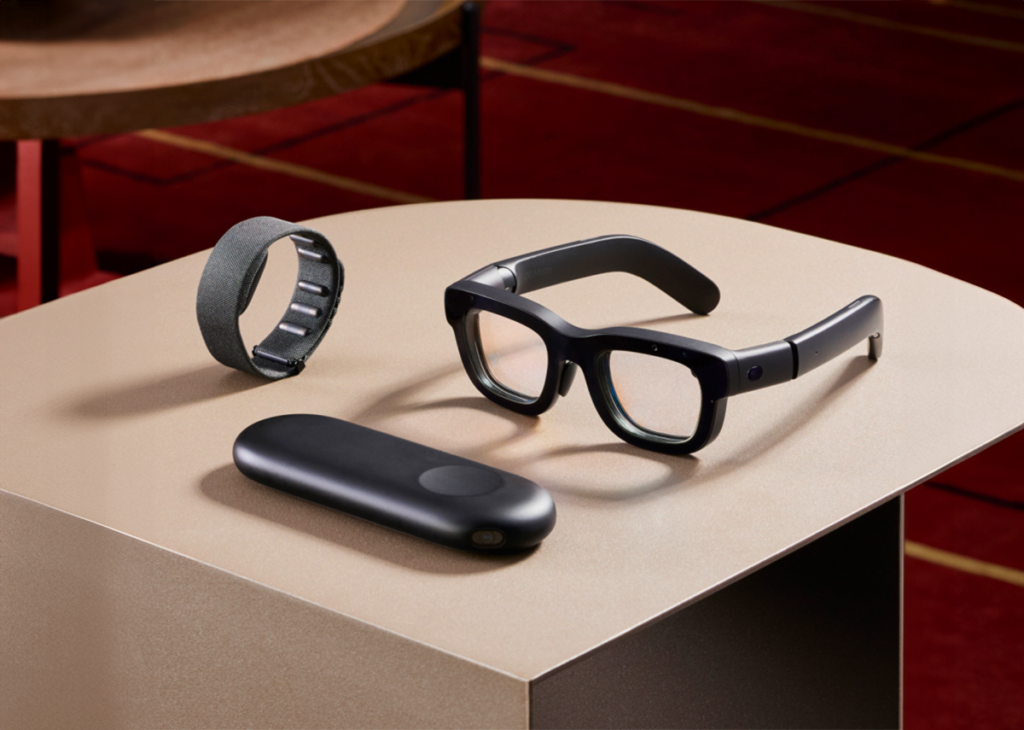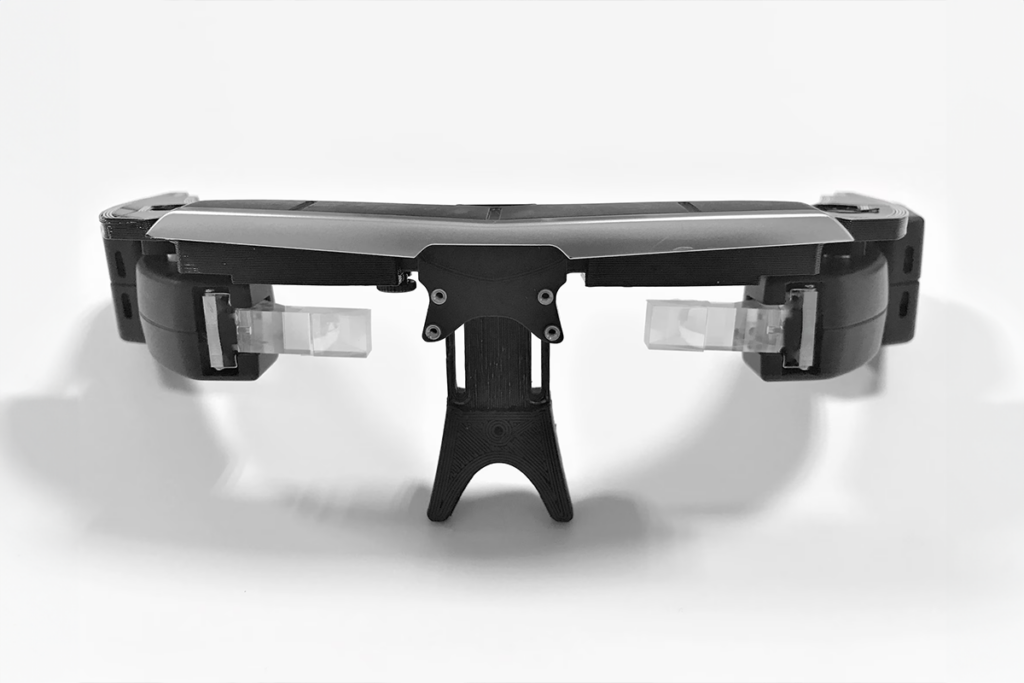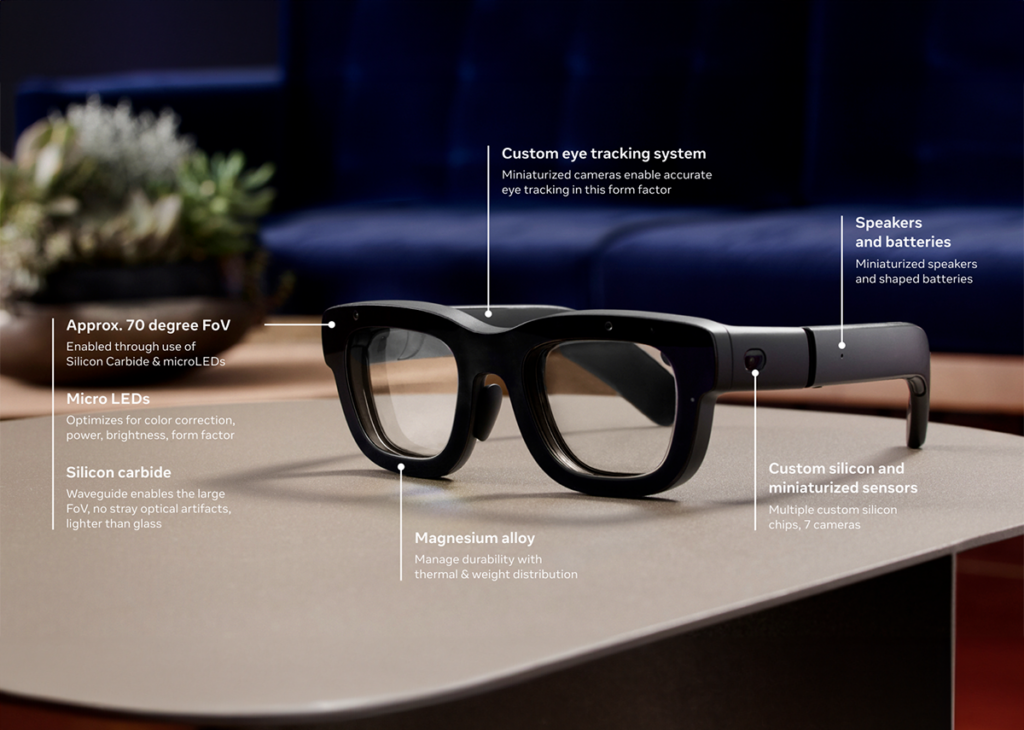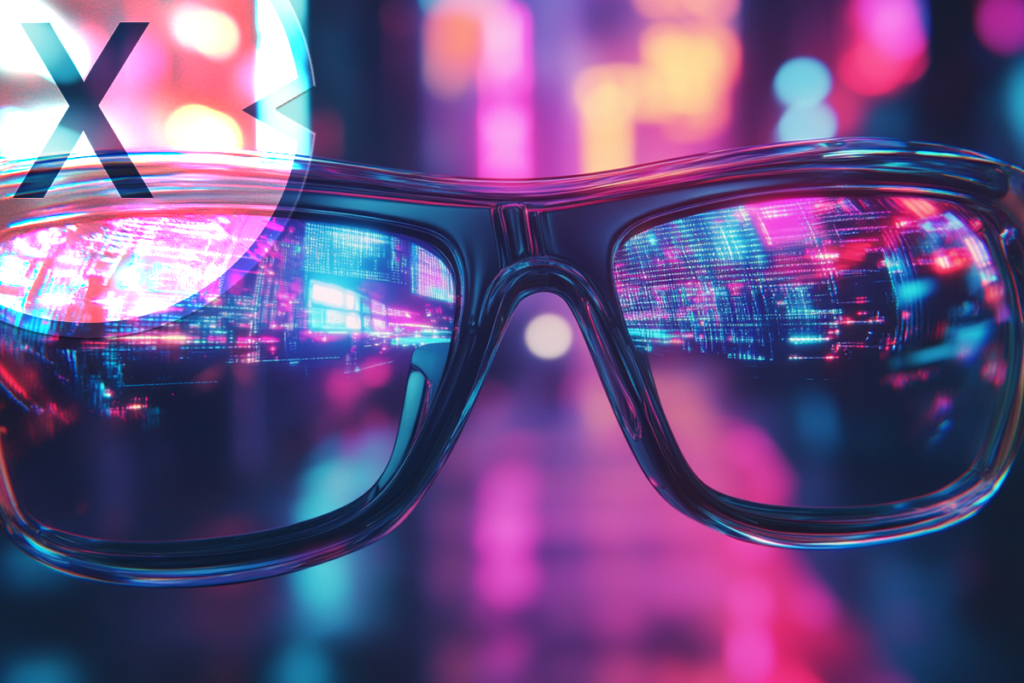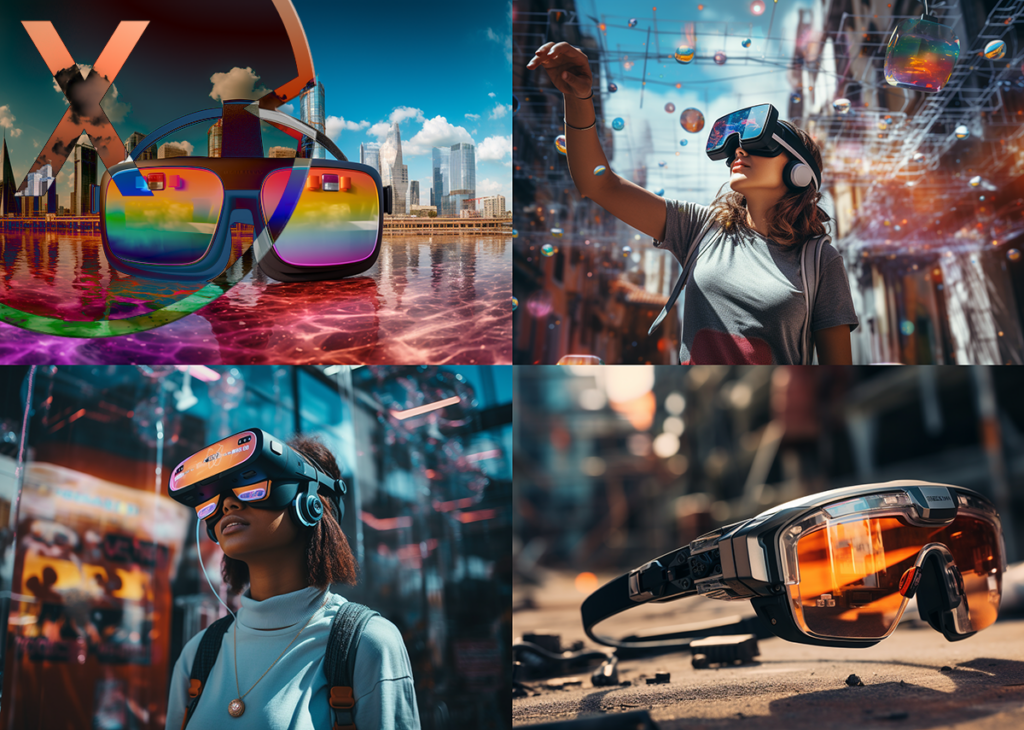Published on: November 4th, 2024 / Update from: November 4th, 2024 - Author: Konrad Wolfenstein
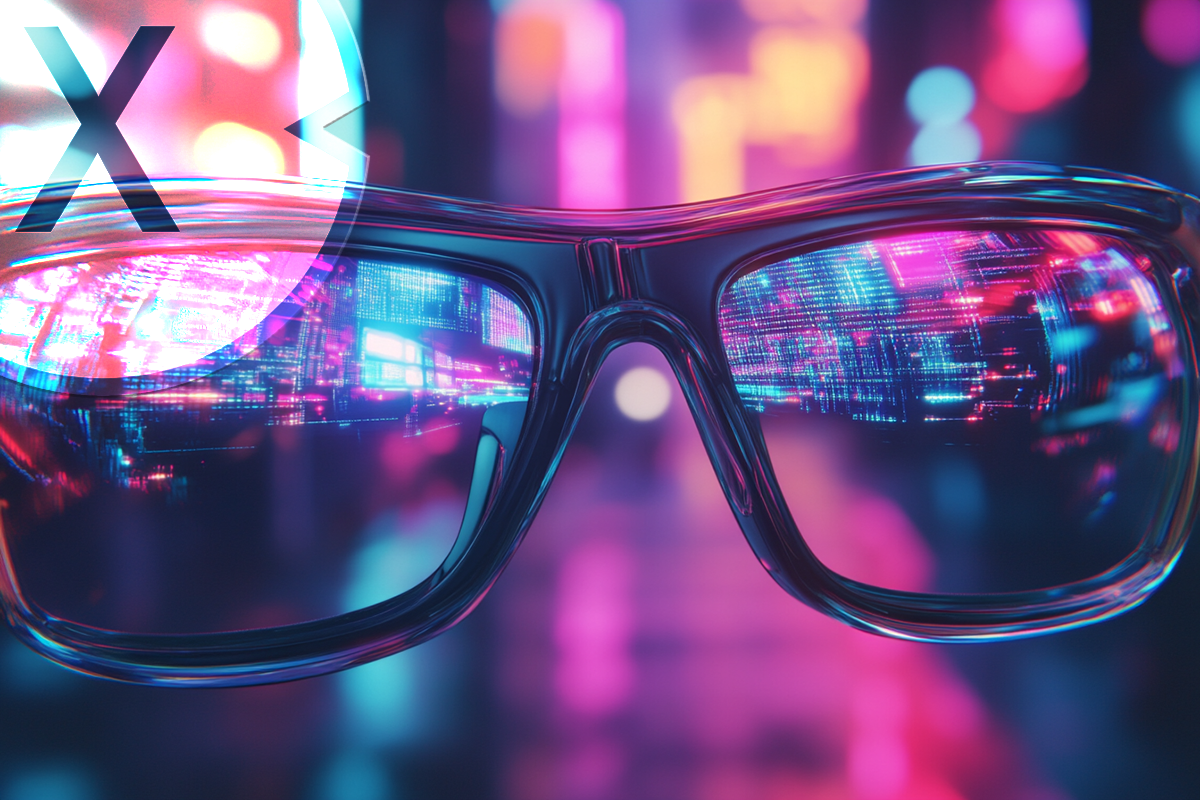
Is Meta's Orion AR Glasses Compute Pack a significant disadvantage compared to TDK's FCLM technology? – Creative image: Xpert.Digital
Innovation in comparison: The AR approaches from Meta and TDK in check
Meta's Orion AR glasses Compute Pack presents both advantages and disadvantages compared to TDK's FCLM (full-color laser module) technology, especially in terms of usability and design of AR glasses.
Meta Orion AR Glasses Compute Pack
Meta's Orion AR glasses feature a slim form factor, made possible by offloading some of the computing power into an external pocket computer, called the Compute Pack. This wireless processor handles the rendering of the AR graphics and the calculations for the tracking systems. The advantage of this solution is that the glasses themselves remain lighter and less bulky, which improves wearing comfort.
However, there are also clear disadvantages:
- Dependency on the Compute Pack: The glasses only work at a limited distance (up to 3.5 meters) from the Compute Pack. If you move further away, the glasses become unusable.
- Battery life: The Orion glasses have a relatively short battery life of around two hours, which could be problematic for everyday use.
- Complexity and Cost: The need for an additional device increases the complexity and potentially cost of the system.
FCLM technology from TDK
In contrast, TDK's FCLM technology offers a more compact and integrated solution for AR glasses. The ultra-compact full-color laser module allows images to be projected directly onto the user's retina, resulting in clearer and sharper images. This technology is particularly light (only 0.38 grams) and takes up less space, making it possible to make AR glasses slimmer and more comfortable.
Advantages of FCLM technology:
- Compactness: The FCLM module is extremely small and lightweight, allowing integration into smaller and more elegant AR glasses.
- Direct Retina Projection: This technology provides sharp image representation regardless of the user's vision.
- Independence from external devices: Since FCLM technology is integrated directly into the glasses, no additional hardware such as a compute pack is required.
Our opinion
The Compute Pack of Meta's Orion AR glasses can be considered a disadvantage as it limits freedom of movement and requires additional hardware. In comparison, TDK's FCLM technology offers a more compact and integrated solution that improves both comfort and image quality. FCLM technology could therefore represent a more promising option for future AR glasses, especially when it comes to usability and mobility.
More about it here:
- It is a milestone for the Extended Reality (XR) industry: The new AR glasses “Orion” by Meta-Image: Meta
- Advances in XR technology for the Metaverse, AR and VR glasses: full-color laser for 4K smartglasses from TDK - Image: TDK
- Smart Glasses Orion from Meta: The future of augmented reality – Extended reality with Metaverse is only a matter of time – Image: Meta
- Is Meta's Orion AR Glasses Compute Pack a significant disadvantage compared to TDK's FCLM technology? – Creative image: Xpert.Digital
- Battle of the XR glasses: Differences between Meta Quest 3 and Apple Vision Pro – Image: Xpert.Digital
- Intelligent and suitable for everyday use: Full-color 4K smart glasses for augmented reality applications are only a matter of time - creative image: Xpert.Digital
What is the 'Compute Pack' of Meta's Orion-Ar glasses?
The Compute Puck is an external device that Meta developed for its AR glasses, such as the Orion AR Glasses. It's a separate, wireless module that handles much of the computing power to keep the glasses themselves lighter and more compact. The Compute Puck handles complex tasks such as app logic and advanced calculations, while the glasses directly manage functions such as hand and eye tracking and the display of augmented reality content.
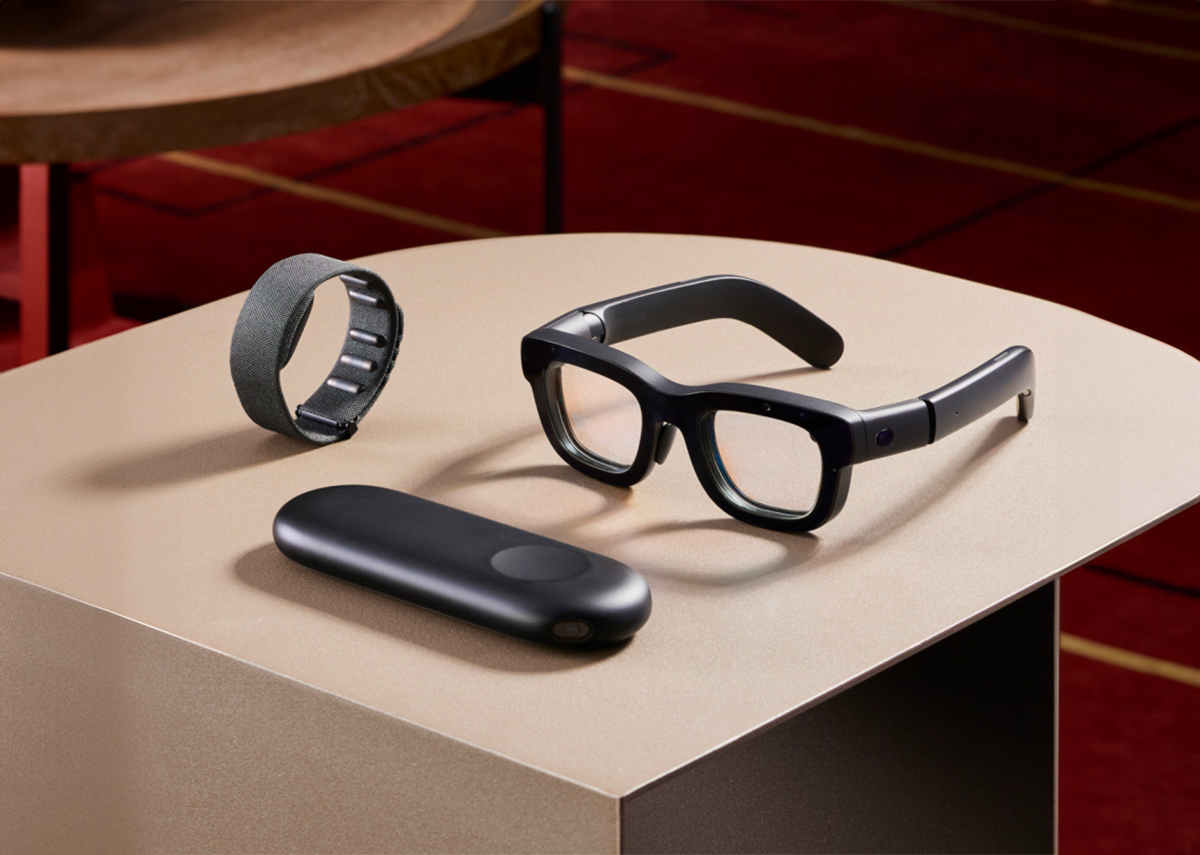
The glasses must be paired with a “neural bracelet” (left) and a wireless compute puck (middle) – Image: Meta – Image: Meta
Key features of the Compute Puck include:
- 5G modem for fast connectivity
- Touchpad for control
- Qualcomm chipset for computing tasks
- Camera for full color recordings
Previous prototypes of the puck included additional features such as a LiDAR depth sensor and a projector for displaying images on surfaces, but these were dropped from the final version due to cost reasons.
The Compute Puck allows the glasses to be lightweight and ergonomic as it shifts the computing load from the glasses to an external device. However, this can pose a certain limitation for users as they have to carry an additional device with them, which could potentially affect mobility[3].
Comparison of modern augmented reality technologies: Meta Orion and TDK FCLM
In the world of augmented reality (AR) technologies, hardware is constantly evolving to meet the demands of mobility, computing power and user comfort. Two outstanding technologies in this area are the “Meta Orion Compute Pack” and the “TDK FCLM technology”. Both solutions aim to make it easier to integrate AR into everyday life, but take different paths to achieve this. Below we will examine the main differences, advantages and disadvantages of the two technologies in more detail in order to provide a better understanding of their respective properties and possible uses.
1. Form factor and construction
One of the biggest challenges in the development of AR technology lies in the form factor, as the device not only has to be powerful, but also as compact and light as possible. The form factor plays a crucial role in comfort and practical use in everyday life.
The Meta Orion Compute Pack follows an approach in which the computing unit is housed in a separate pocket computer. This slim form factor allows the AR glasses themselves to be kept very light, as the computing-intensive processes take place externally. This means users can wear the glasses longer and more comfortably, which is particularly advantageous for applications in the work environment and in social interactions. However, this requires the user to always carry the Compute Pack with them, which may limit a certain degree of independence depending on the application.
In contrast, TDK FCLM technology integrates all necessary components into the glasses frame itself. This creates an even slimmer and lighter form factor that requires almost no external components. This technology uses an ultra-light laser module that weighs just 0.38 grams, making the glasses feel almost like ordinary glasses. Thanks to this design, FCLM technology is particularly inconspicuous and offers a high degree of mobility without the user having to carry additional hardware. This makes them ideal for undisturbed use in everyday situations.
2. Computing power and data processing
Computing power plays a central role in AR applications as it determines how quickly and in detail information can be processed and displayed. The choice of architecture – internal versus external – is crucial.
The Meta Orion Compute Pack relies on an external computing unit housed in a pocket computer. This external solution allows high computing power and flexibility, as the computing unit can be scaled and optimized independently of the glasses. This can be particularly useful in professional environments where performance-intensive applications are required. The ability to update the computing unit could allow AR glasses to last longer in the future without having to replace the entire device. On the other hand, the need for an external handheld computer limits the freedom of movement and independence of users.
The FCLM mainly focuses on the image projection technology rather than the entire computing system of the glasses. It is not clear how TDK's FCLM technology incorporates an integrated computing unit; rather, it is an ultra-compact laser module for image projection. The computing power could therefore depend on other components.
3. Independence and freedom of movement
The independence of the hardware significantly influences the user-friendliness of AR technologies. Today, users expect portable devices that they can use without restrictions or additional hardware.
The Meta Orion Compute Pack relies on the proximity of the pocket computer because the glasses themselves do not have an independent computing unit. This means that users rely on a certain range between the glasses and the Compute Pack to ensure full functionality. In situations where mobility or freedom of movement plays an important role, this could be perceived as a disadvantage as the pocket computer must always remain close at hand.
TDK FCLM technology solves this problem through its fully integrated architecture. Users are not dependent on external hardware and can move freely without having to worry about the position of a compute pack. This increases comfort and allows the AR glasses to be used in a variety of situations, such as outdoor activities or sports, where mobility plays a key role. This freedom is a clear advantage of FCLM technology and opens up new possibilities for the use of AR in everyday life.
4. Image representation and visual quality
Image quality is crucial to the AR experience, as a clear and crisp representation of the virtual content can mean the difference between an immersive and disappointing experience.
The Meta Orion Compute Pack uses uLED projection, which ensures a good field of view and attractive image quality. Projection technology enables AR content to be displayed in bright colors and with clear visibility, even in different lighting conditions. However, the image sharpness is not at the same level compared to TDK's Retina projection technology, which can be particularly noticeable when displaying very fine details.
TDK FCLM technology uses direct retina projection. This method projects images directly onto the user's retina, allowing for a particularly sharp and clear display. Retina projection technology is capable of displaying the finest details in high resolution, creating an immersive and realistic viewing experience. FCLM technology offers a clear advantage, especially for applications that require high visual accuracy.
5. Weight and portability
The weight of AR glasses has a direct impact on comfort and usability. A lightweight device is easier and longer to carry, contributing to a pleasant user experience.
While the Meta Orion Compute Pack is relatively light, the weight of the Compute Pack being worn separately from the glasses also needs to be taken into account. Depending on the application, this could affect the overall benefit because the pocket computer also has to be carried.
In comparison, TDK FCLM technology features an ultra-light laser module that weighs just 0.38 grams. This low weight makes the glasses themselves extremely light and comfortable to wear, which is particularly important in everyday use. Users can easily wear the AR glasses for longer periods of time without an additional device restricting freedom of movement.
6. Battery life and energy efficiency
Battery life is one of the key challenges in wearable AR devices. A short battery life significantly limits the possible uses and reduces practicality in everyday life.
With the Meta Orion Compute Pack, the battery life is limited and averages around two hours. This could limit the range of use, especially for applications that require prolonged use, such as in professional environments. Users will need to charge the Compute Pack regularly or consider an external power source to extend operating time.
The battery life of the TDK FCLM technology, however, depends heavily on the design of the glasses themselves and can vary depending on the implementation. However, since the technology relies on an ultra-light and energy-efficient laser module, it is expected that overall battery life can be improved. Thanks to the energy-efficient design of FCLM technology, manufacturers have the opportunity to flexibly adapt the battery life to the respective requirements.
Unique benefits
The Meta Orion Compute Pack as well as the TDK FCLM technology have unique advantages for various augmented reality applications. While the Meta Orion Compute Pack scores points in professional scenarios with its flexible computing unit and uLED projection, the TDK FCLM technology impresses with its complete integration, mobility and the high image quality of the retina projection. The success of either technology will largely depend on what priorities users set and the context in which the glasses are used.
Suitable for:


